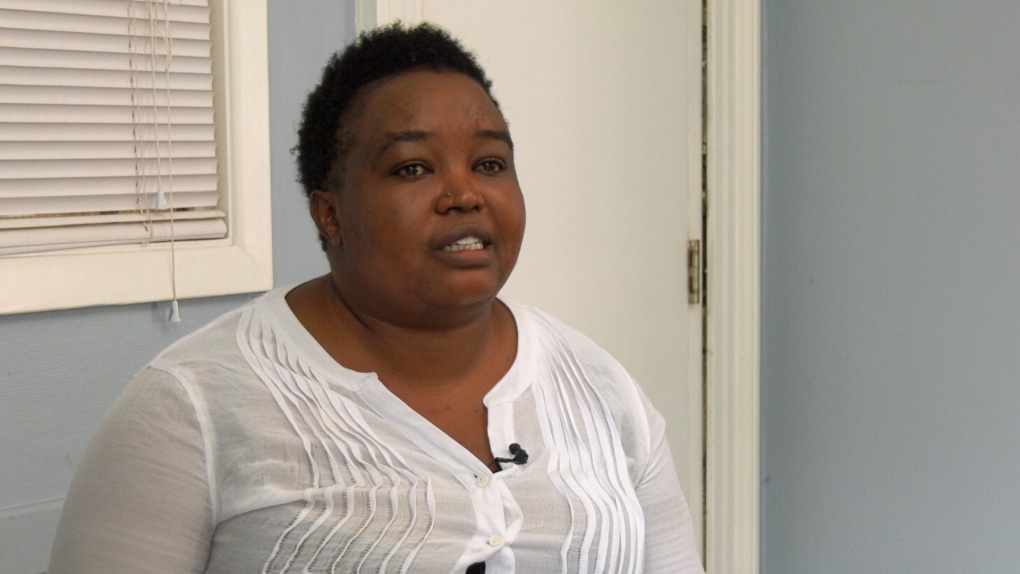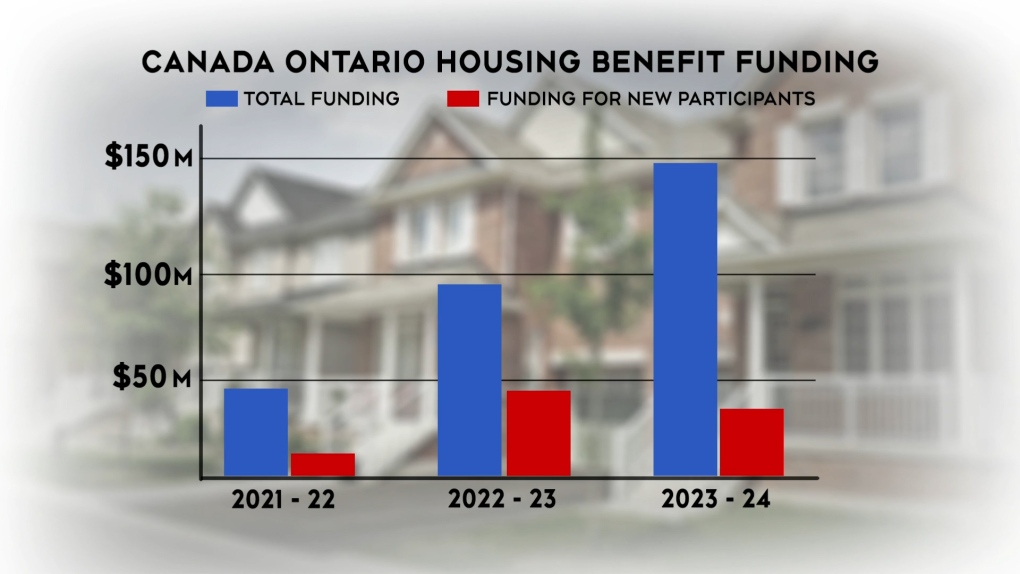Funding fight with feds strands refugees in Toronto shelters, pushing more to street
Hundreds of refugees are stuck in Toronto shelters, waiting for rental top-up funding that could help them move into the private rental market, but ran out just months into this year, shelter workers say.
The backlog that has created is one reason there’s no room to house dozens of new refugees who are waiting and sleeping on the street outside an intake office on Peter Street in downtown Toronto — on top of a funding fight between all levels of government on who should pay to house desperate people fleeing their home countries.
- Download our app to get local alerts on your device
- Get the latest local updates right to your inbox
“This is no longer a housing crisis or a homeless crisis, this is a humanitarian crisis,” said Siu Mee Cheng, the executive director of Street Haven.
Normally, Street Haven would serve 1,000 people a year in their two shelters, but she said because the forward movement has essentially stopped, their system may only serve 500 this year — a situation replicated at other shelters in the city, she said.
“As there are more refugees coming here, we can’t move them into the shelter because the ones who were here say six months ago or four months ago cannot move out ... You see this backing up of people who need help and the fact the system is completely at capacity,” she said.
One refugee in the shelter, Theresia Makumi, said she left Kenya because her life was in danger. Makumi is a trained engineer in her home country, eligible for funding, and says she would like to start working as soon as she can.
“You talk about Canada, Canada is known for its kindness,” she said. “We will stand again. We will be able to contribute to this beautiful country with great people and great minds.”
 Theresia Makumi, a refugee from Kenya, speaks to CTV News Toronto on July 11, 2023.
Theresia Makumi, a refugee from Kenya, speaks to CTV News Toronto on July 11, 2023.
The funding that would help these refugees move on is the Canada-Ontario Housing Benefit, or COHB. It’s a program designed to top up rent for low-income people to help them get an affordable home in the private rental market.
Provincial figures show that funding amount is climbing rapidly, from about $48 million province wide to just under $150 million in three years.
But much of that money is going to existing recipients on the program, and money for new participants is actually falling, from about $45 million last year to $35 million this year.
Toronto’s share of the new funding dropped from $12.3 million in 2022-2023 to $9.5 million in 2023-2024, those figures said. The city said it ran out of that pot of money in May.
- 'A HUGE SHAME': Asylum seekers sleeping on the streets of Toronto as city, feds argue over who should foot the bill
Without new money, getting low-income people off that program requires them to afford market rents by themselves — difficult in a housing crisis that requires much more action, said NDP housing critic Jessica Bell.
“It requires all levels of government to acknowledge that we need to do so much more than we are already doing to make housing affordable,” Bell said. “We are calling for big investments into affordable housing, as well as strong rent controls so we can stabilize the price of rent and crack down on speculations to make housing more affordable for everyone from newcomers to first-time homebuyers to renters. It’s essential.”

The provincial government said in a statement it updated the COHB monthly benefit calculation in July to increase the benefits for many new existing households.
“For example in Toronto, we believe that at a minimum, the 2023-24 planning allocation will bring an additional 650 new households into the program. Province-wide, we anticipate an additional 3,750 households will be enrolled into the program this year. That is on top of the 17,500 households that are already participating in this COHB program,” a statement said.
The province alleged the federal government is underfunding Ontario by approximately $480 million for housing and homelessness over the term of the National Housing Strategy, when compared with Ontario’s share of households in Core Housing Need, which is the highest in the country.
It’s not the only funding fight affecting the group of people waiting on Peter Street: the City of Toronto has also been demanding $157 million in new funding from the federal government to cover the cost of helping asylum seekers.
Immigration, Refugees and Citizenship Canada said the federal government had previously provided $215 million to the city to address “extraordinary interim housing pressures” resulting from increased numbers of asylum claimants arriving in Toronto, and planned to add an additional $175 million in the coming year.
Another refugee in Street Haven’s shelter, Florence Nakayenga, said she would like to move on and make room for more desperate people.
“I wish the COHB could hear our prayers and they could open up again,” she said.
 A woman is seen surrounded by luggage and other personal belongings outside a shelter intake office in Toronto on July 11, 2023.
A woman is seen surrounded by luggage and other personal belongings outside a shelter intake office in Toronto on July 11, 2023.
CTVNews.ca Top Stories

Mark Carney tells Jon Stewart the Liberal party has 'a chance' after Trudeau's resignation
Days ahead of his expected Liberal leadership campaign launch, former Bank of Canada and Bank of England governor Mark Carney says Prime Minister Justin Trudeau's decision to step down boosts the party's chance in the next general election.
Harm reduction advocates hope high court will 'clarify' Canada's 'Good Samaritan' law
Canada's Good Samaritan law, which is meant to shield people from arrest after they seek help for someone in medical distress, is under spotlight in the Supreme Court of Canada.
'We can live our lives again without worrying': Ontario man relieved after insurance company agrees to pay $620,000 hospital bill
An Ontario man who received a $620,000 medical bill from a Florida hospital is now relieved that his insurance company has reversed its decision and decided to pay the bill.
Ontario Premier Doug Ford to speak in Toronto
Premier Doug Ford is set to speak in Toronto on Tuesday morning, after addressing early Ontario election rumours a day earlier.
Queen Elizabeth II wasn't told about Soviet spy in her palace, declassified MI5 files show
Queen Elizabeth II wasn’t told details of her long-time art adviser's double life as a Soviet spy because palace officials didn’t want to add to her worries, newly declassified documents reveal.
Hamas has accepted a draft agreement for a Gaza ceasefire and the release of hostages, officials say
Hamas has accepted a draft agreement for a ceasefire in the Gaza Strip and the release of dozens of hostages, two officials involved in the talks said Tuesday. Mediator Qatar said the negotiations were at the “closest point” yet to sealing a deal.
Kate Middleton, Princess of Wales, visits hospital where she had cancer treatment
Kate, Princess of Wales, visited a London hospital on Tuesday where she underwent cancer treatment last year to personally thank medics there for their care and support, her office said.
Strong winds forecast for Los Angeles threaten area's fight against fires
Additional water tankers and scores of firefighters have arrived at the Los Angeles area ahead of fierce winds that were forecast to return and threaten the progress made so far on two massive infernos that have destroyed thousands of homes and killed at least 24 people.
Icelandic discount carrier Play Airlines pulls out of Canada, leaving customers in dark
Play Airlines is pulling out of Canada less than two years after entering the market.

































